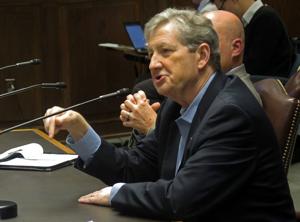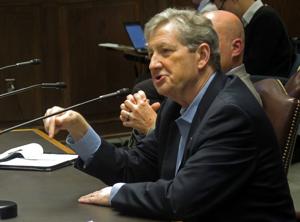
WASHINGTON – The Mexican ambassador to the United States this week slammed Louisiana Sen. John Kennedy for using “vulgar and racist” language, after Kennedy said at a recent Senate hearing that Mexicans “would be eating cat food out of a can” if not for the U.S.
“I don’t think the people of Louisiana feel represented by the vulgar and racist word you used,” wrote Esteban Moctezuma in a May 12 letter publicly released Monday. “You are obliged to offer an apology to your citizens because what you asserted is not worthy of the state of Louisiana, known for being a cultural melting pot.”
Moctezuma also said that Louisiana greatly benefits from its relationship with Mexico, as trade between Mexico and Louisiana amounts to about $40 billion. The difference between goods bought and sold, he said, are in Louisiana’s favor by about $25 billion. He added that the state’s trade with Mexico generates work to support about 70,000 Louisiana families.
Kennedy and his press office did not respond to a request for comment Wednesday.
The ambassador reacted to Kennedy’s grilling of Drug Enforcement Administration Director Anne Milgram during a May 10 hearing of the Senate Appropriations subcommittee reviewing DEA and FBI budget requests.
Four times during that hearing, Kennedy suggested that the U.S. military or police agencies should cross the border to wipe out the Mexican organized crime cartels that make and smuggle fentanyl, a synthetic opioid anesthetic, into the U.S.
“This is the way the American people, whose sons and daughters are dying look at it,” Kennedy said. “Our economy is $23 trillion. Mexico’s economy is $1.3 trillion. Ours is 18 times bigger. We buy $400 billion every year from Mexico. Without the people of America, Mexico figuratively speaking, would be eating cat food out of a can and living in a tent behind an Outback. So, why don’t you and the president, embarrassing no one, get on the phone and call (Mexican) President (Andrés Manuel) López Obrador and make him a deal he can’t refuse to allow our military and our law enforcement officials to go into Mexico and work with his to stop the cartels? Why don’t you do that?”
After a pause, Milgram responded: “Senator, what I am doing every single day is working with the incredible men and women of DEA who are risking their lives…”
Kennedy interrupted: “And I appreciate that, but you’re not doing what would work. Why aren’t you doing what would work?”
Kennedy often makes headlines for his colorfully rustic – and often controversial – statements; YouTube says videos of his observations exceeded a half million views during the past four months. But his comments in this instance initially went little noticed by the press.
The day after the hearing, however, the Mexico Solidarity Project, a grassroots group based in San Diego, equated “Kennedy’s rant” to the rhetoric used before the U.S. invaded Iraq and Afghanistan. The group recalled U.S. Secretary of State Anthony Blinken’s recent suggestion that the Biden administration designate Mexican cartels as Foreign Terrorist Organizations, which is the first step towards justifying unilateral military action by the U.S.
Mexico’s Secretary of Foreign Affairs Marcelo Ebrard told Mexican media on May 12 that Kennedy’s comments amounted to “racism against Mexicans, and in general all Spanish speakers.” Bloggers picked up Ebrard’s outrage; it was also reported over the weekend by Gambit, a New Orleans weekly, and by British newspapers.
The day before Appropriations’ subcommittee hearing, the Senate sidetracked Kennedy’s “Fairness in Fentanyl Sentencing Act.” He proposed reducing the amount fentanyl a person possessed to receive the five-year mandatory minimum sentence from 40 grams to two grams.
“To be clear: This bill does not aim to punish addicts for falling victim to cartel schemes hatched in Mexico and fueled by Chinese fentanyl makers. Like other parents in Louisiana, I want to help fentanyl victims before it’s too late,” Kennedy said on May 9.
The next morning, op-eds written by Kennedy appeared in several Louisiana newspapers. “In 2021, 94% of drug overdose deaths in New Orleans were related to fentanyl. East Baton Rouge Parish’s coroner investigated 300 overdose deaths and found that 88% of those deaths involved fentanyl. In the average month, St. Tammany Parish loses 10 or 11 people to fentanyl overdoses,” Kennedy wrote.


Leave a Reply